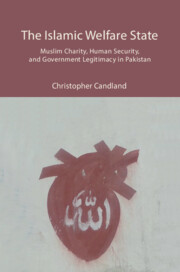Book contents
- Frontmatter
- Dedication
- Contents
- List of Illustrations
- Preface
- Note on Translations and Transliterations
- List of Abbreviations
- Part 1 Introduction
- Part 2 Piety and Public Goods
- Part 3 Pakistan
- Part 4 Charities
- Part 5 Religion, State, and Public Goods
- Afterword
- Acknowledgments
- Appendix: Charities Studied
- Glossary
- References
- Index
2 - The Good of Government
Published online by Cambridge University Press: 30 April 2024
- Frontmatter
- Dedication
- Contents
- List of Illustrations
- Preface
- Note on Translations and Transliterations
- List of Abbreviations
- Part 1 Introduction
- Part 2 Piety and Public Goods
- Part 3 Pakistan
- Part 4 Charities
- Part 5 Religion, State, and Public Goods
- Afterword
- Acknowledgments
- Appendix: Charities Studied
- Glossary
- References
- Index
Summary
If we cannot follow the law, what is the point of having a law?
—Awais AlamA mid-morning earthquake in the mountains of Pakistan on October 8, 2005, leveled homes and schools, and killed, injured, and trapped under rubble tens of thousands of people. Within hours, people from across the country were in caravans with donations of medicine, water, food, tents, blankets, and clothes. People abandoned their jobs to become full-time volunteers for relief work. The humanitarian activity continued for months. Some volunteers stayed in the charitable sector for years. The United Nations Office for the Coordination of Humanitarian Affairs estimated correctly the number of homeless—700,000 people—but overestimated the number of tents required by hundreds of thousands, because those people whose homes were still habitable gave shelter to hundreds of thousands of strangers.
The Pakistani military began operations against the Tehreek-i-Taliban Pakistan in Swat in May 2009. To escape the Pakistan Air Force aerial bombardment and Pakistan Army artillery shelling and small arms fire, almost the entire population of the mountainous district of Swat fled to the lower-lying districts to the south. In Mingora alone, more than 700,000 people registered with authorities as internally displaced persons (IDPs). They needed food, clean drinking water, medicine, and sanitation facilities. Overnight, hundreds of volunteers associated with dozens of charities arrived to help the affected people. The volunteers worked with determination to reach the affected people with food and other necessities. Their energy contrasted sharply with government aid efforts. Poor handling of relief operations in Bannu for people displaced by air force bombing and military operations in South Waziristan led the military to shoot and wound four IDPs who were seeking food aid being offered by the military.3 Until August 2009 when the military defeated the insurgents and eliminated their command and control structure in the Swat valley, private Islamic welfare associations provided rescue and relief to the IDPs. After the military operations, these associations took the lead in helping the IDPs return to their villages and to rebuild their homes.
Heavy rains and floods in July–August 2010 submerged one-fifth of the country, led directly to the death of 1,750 people, and rendered 8 million people homeless.
- Type
- Chapter
- Information
- The Islamic Welfare StateMuslim Charity, Human Security, and Government Legitimacy in Pakistan, pp. 21 - 32Publisher: Cambridge University PressPrint publication year: 2024

